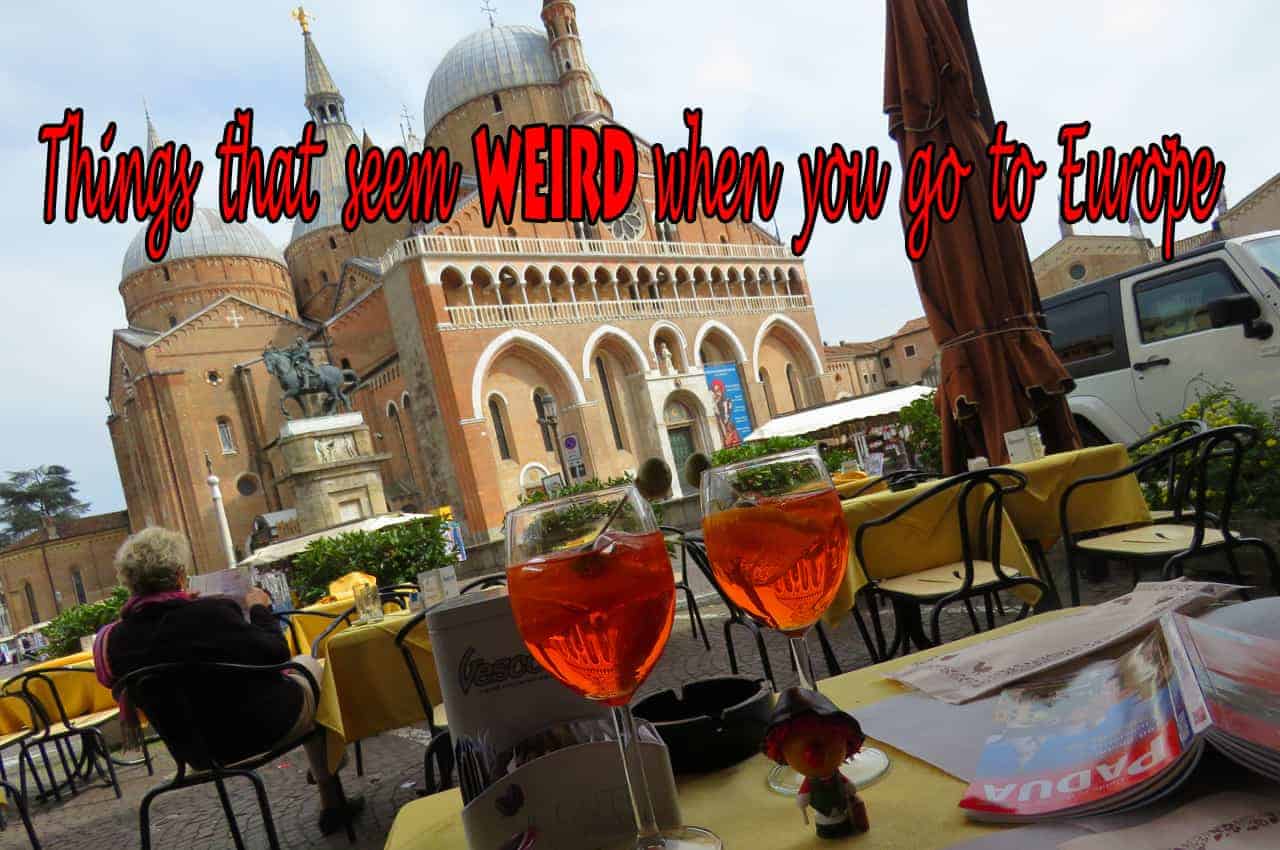
Things that seem weird when you go to Europe
When we left Canada to travel full-time 4 years ago we didn’t think that most of our travels would be in Europe. It’s a continent we’ve fallen in love with. There are many reasons for that which I’ll write about sometime.
Arriving in Europe there are many little things that are very different than in North America. Other differences are very subtle. I decided to write about some of the things that have stood out for us along the way.
Note: I’m not bothering with the glaringly obvious like that Europe is a much smaller continent, that countries are small, that people speak a lot of languages etc, etc. Most people know all that. I’m sticking to particularities that foreigners (especially North Americans) might consider weird, or just different, when coming to Europe.
Also: I’m writing this here because people don’t seem to understand that this post covers our observances travelling through parts of Europe. As I say, there’s 51 (or 44 depending on your criteria) countries and 700 million people in Europe and we haven’t visited them all. These are just our observances based on the countries we’ve been. If you’re in Sweden chances are your observations/experiences won’t be the same as in Spain, Croatia or Ukraine. But feel free to comment on them – because this post is about things that seem weird to non-Europeans when coming from outside Europe. And don’t take this post so seriously, this post was meant to be light hearted…
Let’s go in order of things you might encounter as a visitor.
.
Apartments
If you’re like us, you rent an apartment when you travel (for most people that’s Airbnb). Here are a few issues you might have.
Finding the apartment. In most apartment buildings in Europe, the floors are not indicated, neither are there apartment numbers. Usually the 1st floor starts on the floor up the first set of stairs from the ground floor. But we’ve encountered places where there’s a ‘half floor’ up from the ground floor which is sometimes a floor of offices (that’s happened several times in Prague). So what would be considered a 3rd floor in Europe could end up being equivalent to a very high 5th floor in North America (older buildings in Europe have very high ceilings and many also don’t have elevators). This apartment in Zadar for example, one of the nicest in all our travels, is listed as being on the 4th floor. We counted 100 steps to the top. So just keep that in mind if you have a lot of bags or if you have a disability. As for the lack of indications here’s an example: In Sevilla we arrived at the building, were buzzed in with instructions of “come to the 3rd floor, turn to the left, it’s the 2nd last apartment on the right”. If you’re just off that plane from North America you might find that confusing – you enter a building, you walk up the stairs and see no indications on what floor you’re on and, on each floor, see no apartment numbers or names. Just blank doors. Tip: we’ve learned the hard way to get very specific instructions on connecting with you Airbnb host. What instructions do I need when I get to that buzzer downstairs? (you usually need a name). Have a telephone number in case there’s confusion or a misunderstanding. It’s why a SIM card is very helpful. If I don’t have a SIM card, I’ll often ask the taxi driver that is dropping us off to call the number of the owner to let them know we’ve arrived. They’ll often come down to greet you, help you with your luggage, and get into the apartment that first time.
Hot water tanks. Two things about hot water tanks in Europe: 1) hot water tanks are smaller than they are in North America. So you can’t take a 20 minute shower. We timed ours and it gets 8 minute’s worth of hot water. So if you’re washing your hair and using shampoo and conditioner, you might want to turn off the water while you’re lathering up. 2) unlike North America where your big hot water tank sits somewhere where you never see it, in Europe the water tanks are somewhere in the bathroom and kitchen. And they have their own on/off switch in the wall. Unless you like cold water, make sure that the tank is turned on. When the apartment is not being used owners will turn off the tank so they don’t waste electricity.
Showers. Many showers in Europe, especially in older buildings, comprise of a hose and a bathtub. You sit (or stand) in the bathtub and hose yourself down. One thing we’ve really missed is our shower back in Montreal.
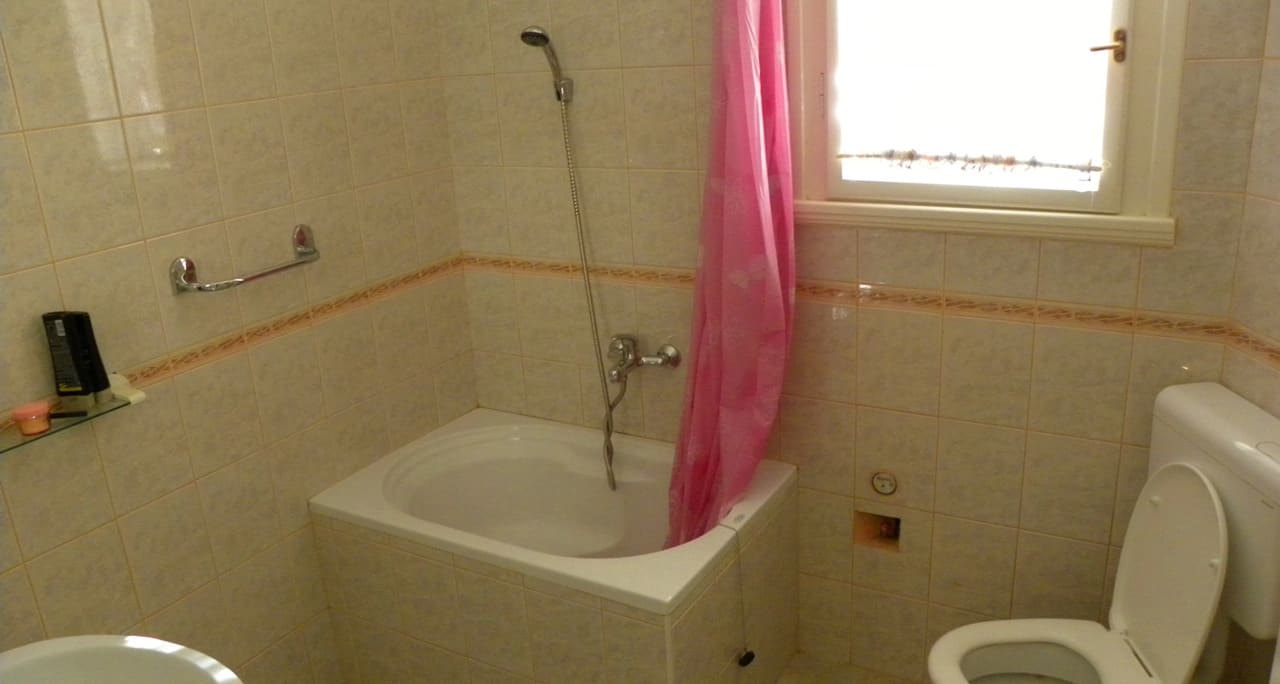
Toilet. It just seems that every apartment we’ve ever stayed in has a different kind of toilet. Usually, the older the better. “Eco, water efficient” toilets are for us code for “you have to flush a lot to get your poop down”. Then sometimes you’ll come across a toilet that has a little ledge where you poop plops down. Lissette calls it the “Poopie Platter”. Somebody told us it’s a German toilet and they do that so that they can inspect their poop. It’s horrible. I don’t know anyone who likes to look straight down at a steaming pile of poop. Trick: If you come across that kind of toilet, put a couple of sheets of toilet paper there before you do your business. It helps with the flush.
Gas stoves. Many European apartments have gas stoves. It’s cheaper. But people get nervous about gas. Make sure to always turn off the stove when you’ve finished cooking. If you’ve never used a gas stove get the owner to show you how to use it.
Lack of dryers. Most apartments have a washer to do your laundry but don’t have a dryer. Instead you’ll hang your clothes on a folding rack or hang outside on a clothesline. Much more energy efficient and your clothes smell better.
Public
Honor system on public transport. In most of Europe public transportation is fantastic, with networks of trams, metros and buses. And in many of these places there’s an honor system ie. you just get on, no gates, or turnstiles, no queuing etc. That’s not saying that you shouldn’t buy a ticket – you have to and if you get caught without one you’ll pay a big fine. But besides just being more civilized, the ease that this system allows makes for so much more efficiency.
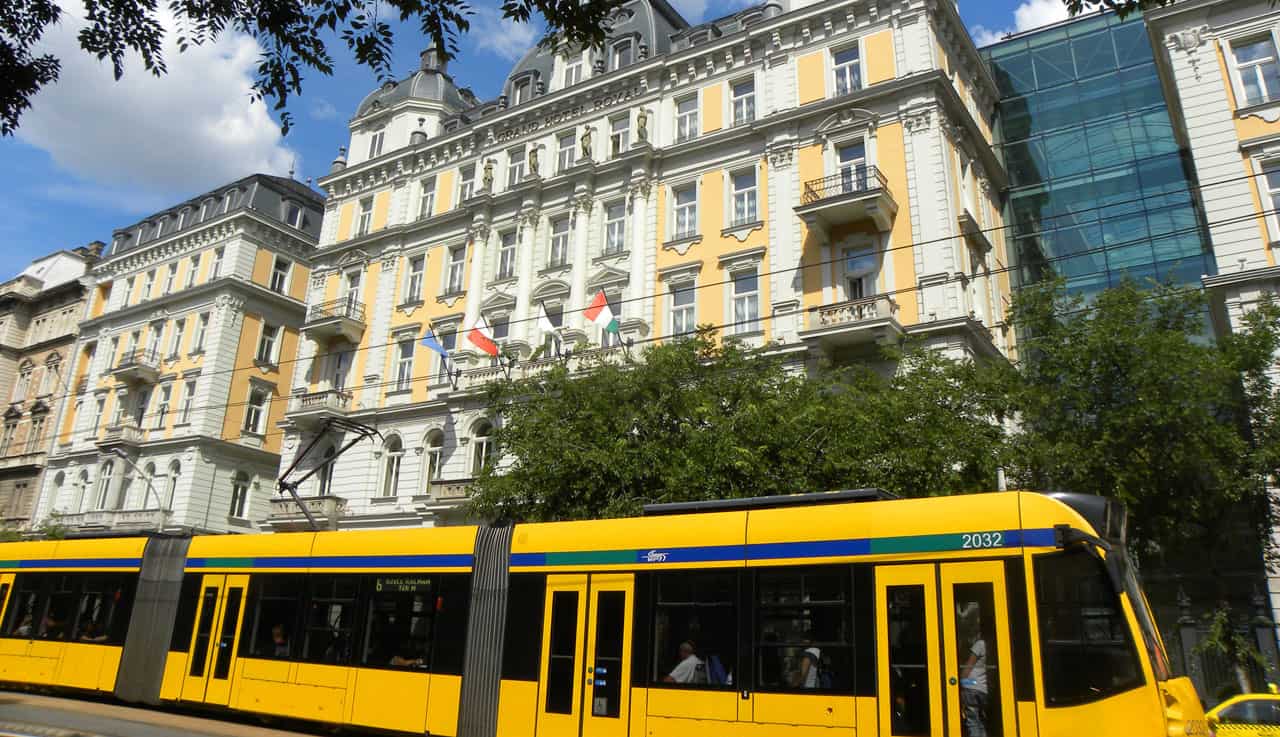
Pay to use bathrooms. One of my biggest peeves is hearing foreigners complain about having to pay to use a public toilet. “It’s a basic human right!” “What if I don’t have change, you’ll deny me the right to use the toilet?”. Come on. In most of Europe you’ll have sparklingly clean public toilets taken care of by an attendant. The ones you have to worry about are the ones that are free, most of them will be disgustingly filthy (Italy sticks out). So carry a bit of change and pay that 40 cents for a toilet. They even have them in public transportation which I’ve never seen in North America (In Montreal we had a great metro system but no toilets. Over 20 plus years I remember a few times that I almost shit my pants going to work). On a side note: Japan is the best when it comes to toilets in public places. You’ll see them everywhere, they’re super clean and you don’t have to pay.
Hard to get good (and BIG) cup of coffee. This pisses off North Americans and I have to admit that includes us. In North America we have big-ass coffee. Even if it’s a cappuccino you can get a big-ass cappuccino. In Europe the coffee cups, even takeaway, are miniature in comparison*. Europeans will say that North Americans don’t know their coffee blah, blah…well, we had great coffee in Montreal plus it was double the size and just a little more expensive then these miniature coffees you get in Europe. And we’ve had plenty of bad coffee in Europe so the quality vs quantity argument is not valid in my opinion. We’ve gotten used to the small coffees and have learned to sit in our favorite café sucking on that one small coffee for an hour…but get us to a big city where they have a Starbucks and we pretty much go crazy.
*Note: The exception for us was Ukraine where we had incredible coffee served in big cups. They’re mostly the exception to the rule though…
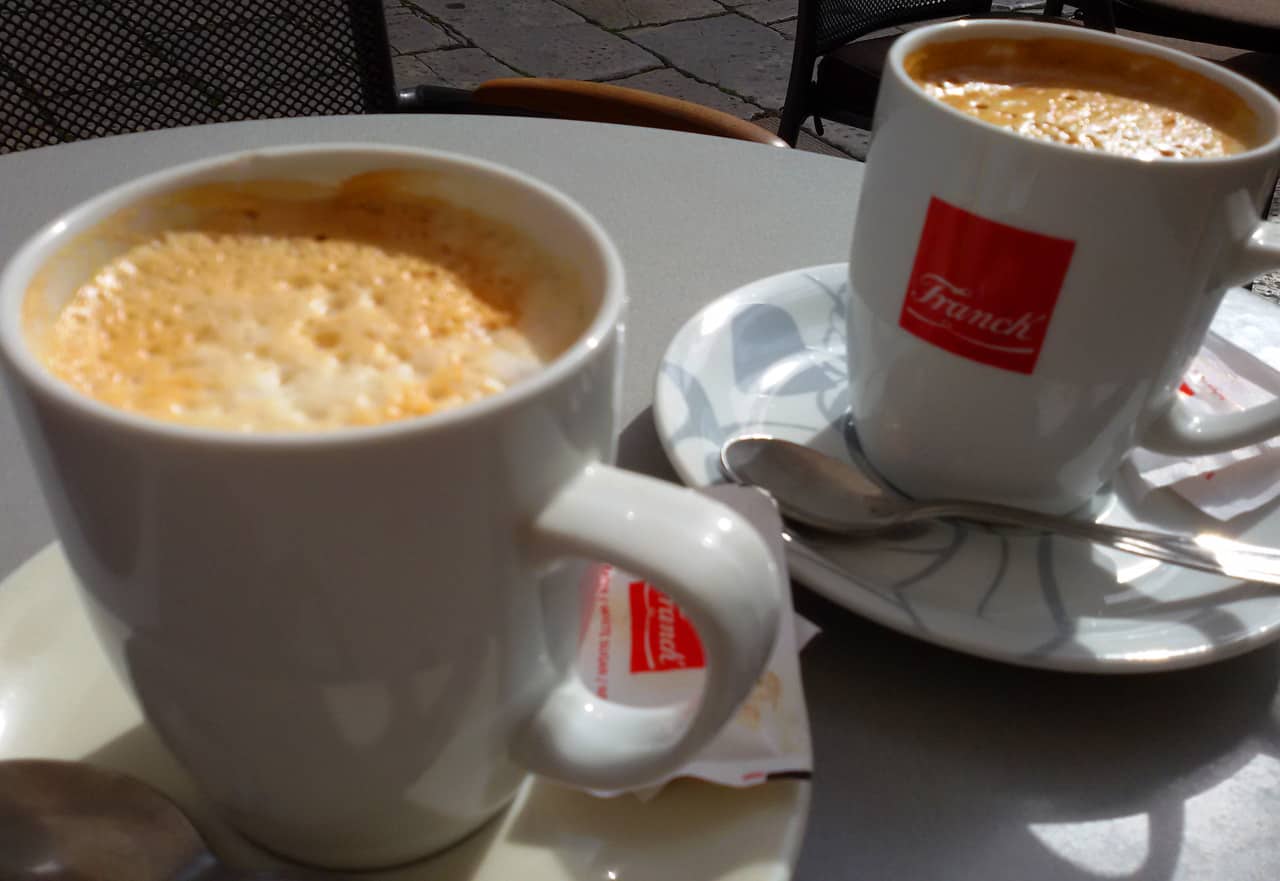
Bad service. Service in Europe often depends on whether or not your waiter is having a good day. You won’t find American-level quality service in Europe (Canada doesn’t measure up to the States either). I will say this though – I have a hard time digesting the way service staff gets paid in the US. A decent, fixed, wage might not give you the best possible service but I think I’d rather that than a man-servant sucking up to me because he needs my tips to feed himself and his family.
Darwin’s rule of evolution applies. It’s great to be in Europe where we can climb towers and ruins…and not have to take in the views through 10 inches of plexiglass. In North America everybody is afraid of getting sued and there’s a fence or barrier around any monument. In Europe you reserve the right to be an idiot and to fall to your death.
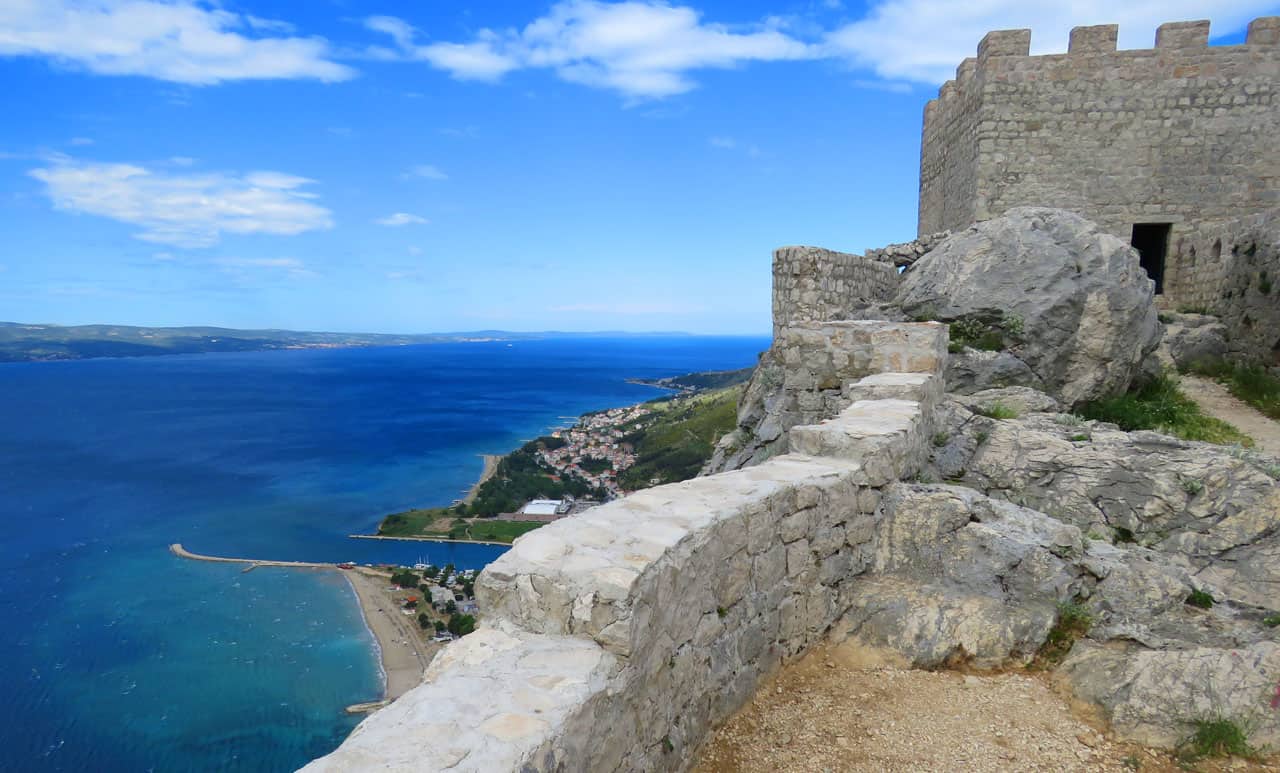
Shopping
Carts with coins. Shopping carts at grocery stores in Europe are chained together and the only way to get a cart is to leave a deposit. So you stick a coin into the handle of the cart and it becomes unchained. What sense does that make apart from just getting frustrated when you can’t figure out the procedure? Is 30 cents going to stop you from stealing a shopping cart? (Lissette tells me she’s seen the same in some American malls. I’ve never seen it anywhere before coming to Europe).
Correction: a few people have mentioned below that the purpose of the deposit is that people don’t leave the carts strewn all over the place. It’s not to prevent stealing. Thanks for the feedback.
Eggs and milk not sold refrigerated. In North America eggs and milk are always refrigerated. Not so in Europe where you’ll often see them unrefrigerated in different sections of the store. I’m not sure about the reason – just know that if you don’t see milk or eggs in the refrigerated section there’s a good chance you’ll find them elsewhere.
Store hours. Store hours can seem a bit weird in some places, mostly in the warmer countries. They’ll often be open in the morning, close down for a few hours in the early afternoon, then be open again in the late afternoon to late evening. Often the hours are dependent on the store – family owned stores especially follow these rules (big chain stores don’t. I usually find early afternoon is the perfect time to do grocery shopping in Spain because nobody else is in there).
People
I’m going to be accused of generalizing here. But you have to generalize when summarizing 700 million odd people living in the 51 countries (or 44 as some are quick to point out) that make up Europe.
Our thoughts and observations on Europeans and how they compare principally to North Americans.
Formality. One of the first things we noticed when we joined a gym in Prague was how people walking into the locker room would say “Dobry den” (good day). We’ve noticed this in most of Europe, people making a greeting when entering or leaving a gym, elevator or doctor’s office. It happens in North America (sometimes) but it happens a lot more in Europe.
The “smiley” factor”. Europeans aren’t as smiley as North Americans. This bothers a lot of first time travellers to Europe who jump to the conclusion that they’re not friendly. I think Europeans have just been socialized differently, it’s not something they automatically do. But it doesn’t mean they’re not friendly. More: Are Eastern Europeans Unfriendly

Staring. My mother was born in Germany and I remember as a kid being embarrassed by how she would sometimes stare at people. “You shouldn’t stare mom, it’s rude” I’d say. “I’m just curious” she ‘d reply. Europeans do tend to stare more than North Americans and it can be disconcerting if they’re both staring and have a serious look on their face. Lissette, who’s born in New York, will tell you that in the US it would be reason enough to pull out a gun. She gets stared at a lot more than me and has a couple of strategies when she gets fed up with it 1) make a crazy monkey face or 2) say “hello”. The person will usually be taken aback and their normal reaction will be to say hello with an embarrassed smile.
Less taboos. Europeans are more relaxed about the body than North Americans are. You’ll see men in speedos, women lying on a beach or public park topless, and children running around naked.
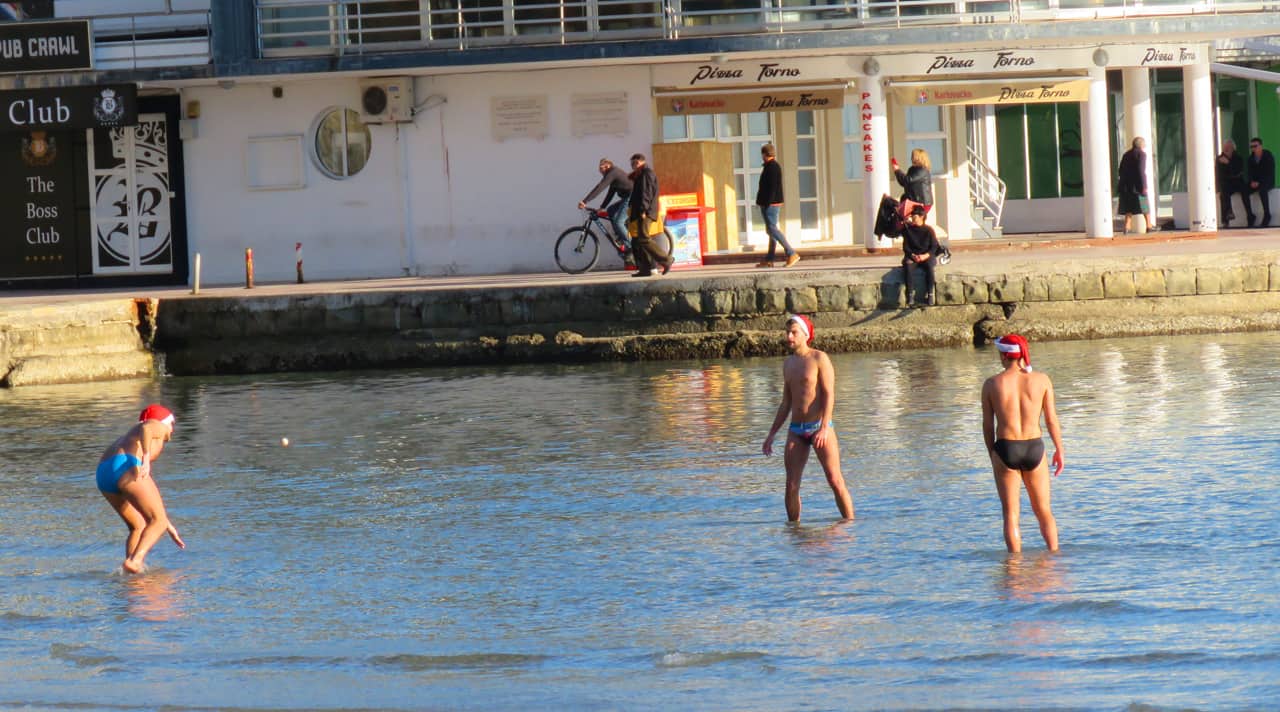
More traditional. This is true mostly to southern Europe where men and women have more defined, traditional roles. Men will work and will often meet their male friends afterwards to hang out. Women still take care of everything in the home. It’s also true in the work place. In southern Europe you won’t see male nurses or female police officers – for the most part roles are still quite separate and traditional.
Personal space. Generally we find Europeans can be less respectful of personal space. Go to a store and you might get someone right up your butt at the cash register. Walk on the sidewalk and you might have 3 locals walking together who don’t want to make room for you. It really irritates the shit out of us sometimes.
They know more about us than we do about them. Europeans are generally better informed and educated about the rest of the world than North Americans are. Part of that is the education system, part of it is because they live on a small continent of many shared languages and cultures, and part of it is media and movies. Europeans (like the rest of the world) know all about America because of movies. Chances are that they also have family in North America. We’ve met so many people in Croatia (and the Czech Republic) who have family in Canada.
Over time, it’s easier to develop relationships. Europeans might be more formal, but I think they’re actually more open to developing relationships than North Americans are. We lived in Montreal over 20 years and although we always met and said “hello” to our neighbors, we never really developed any real relationships. Compare that to Europe where neighbors have invited us for tea or coffee. Same for other people we’ve met: Lissette’s hairdresser, our gym teacher in Budapest, our Airbnb hosts in Spain, Serbia, Romania, and Croatia. Maybe we’re just interesting to them because we’re foreigners? Whatever the case, we feel that people are more open to relationships than people in North America.
Smoking (and smoking around children). There’s a lot of smoking in Europe, especially in the east. And you’ll see mothers puffing around their young kids like there’s no tomorrow. It can be quite shocking.
Other
Dogs are well socialized. In many European countries people really (I mean really) love their dogs. And in return dogs are really well behaved. We saw it in the Czech Republic where dogs are allowed in public transport, restaurants and cafes. They’re incredibly well behaved. During our year living in Croatia we’ve seen the same. Almost every day we go to our favorite café (Café Ovcice) which is always full of locals with their kids and dogs. The dogs are part of the family and are probably better behaved than the kids. Why? I’m guessing it’s just their inclusion in every day life. Aggressive/barky dogs are usually that way because they’re cooped up in their owner’s backyard or apartment and don’t get socialized.
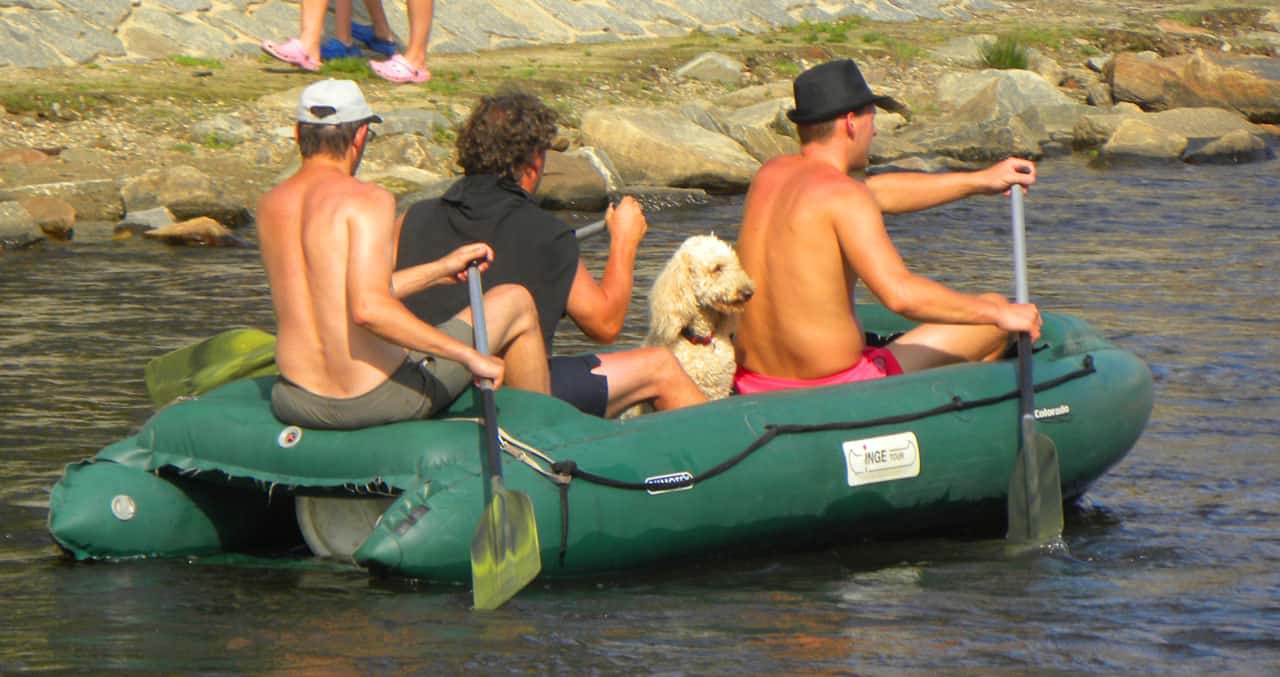
Personal safety. One of the common questions I get from people coming to Split is concerning personal safety. They’re mostly Americans and they get nervous when they see images of some of the “grittier” parts of the city (ie. the more modern parts of the city where you’ve see buildings with graffiti). It’s understandable – the United States is one of the most dangerous countries on the planet and Americans have learned to fear. In comparison, Europe is incredibly safe. Sure, there are always parts of a city that maybe one shouldn’t walk alone at 3 am in the morning – but generally Europe is VERY safe. That includes Split which is one of the safest places you’ll visit anywhere.
‘* the image at the top of the post was taken in Padua (Padova) Italy where we stayed a month in 2016.
.
.
Europe is an incredible continent and wherever you’re coming from you’ll encounter differences that might seem weird. And if you travel throughout Europe you’ll find unique differences in every country you visit. It’s one of the reasons Europe is so fascinating.
We brainstormed the list above over a cup of coffee. I’m sure there are many ‘weird’ differences that we haven’t touched upon (I wrote this from a North American perspective – I can imagine that if you’re reading this and you’re from Asia, Africa, or the Middle East you probably have many other points you can add).
Your turn! What things do you find ‘Weird’ when visiting Europe?
Related: Is it safe to Travel? The weird and scary from 6 years of full-time travel
Related: Our Best and Worst “Slow Travel” Bases over 5 years of Full-time Travel
Related: Tourism…and when the locals hate you
Ps. If you find our blog helpful, please consider using our links to book your flights, hotels, tours, and car rentals. Have a look at our Travel Resources page.

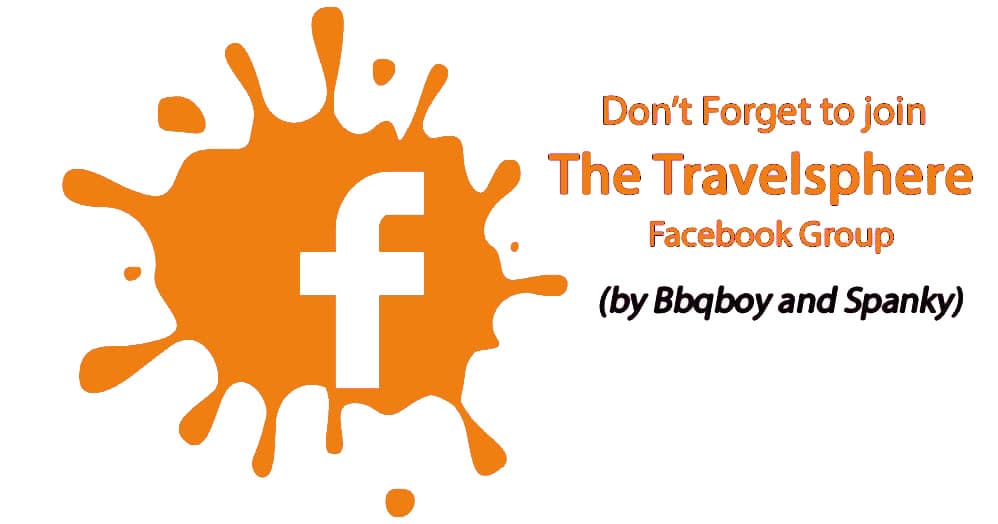
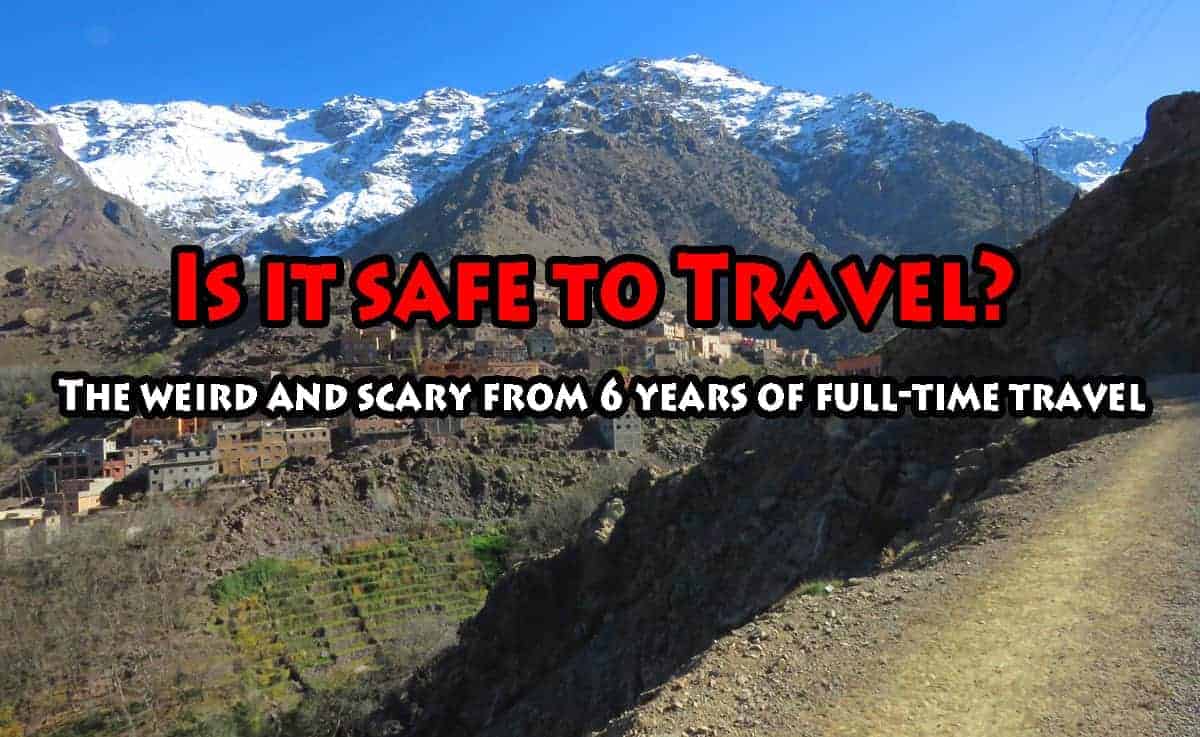
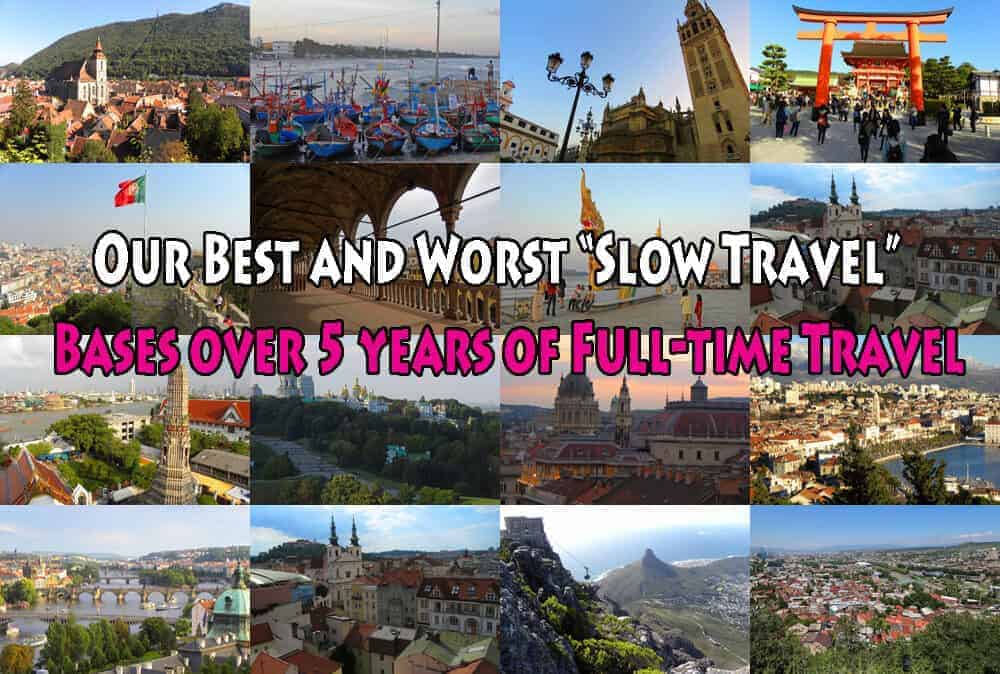

This post brings back memories of things I thought were weird when I came to Sweden in 1980 but now don’t give a second thought about.
1) The washing machines were different. They actually got dirty clothes clean with a limited amount of water waste and the machine itself heated up!
2) In Sweden there are no self-service laundromats. Apartment buildings have laundry rooms with free washers and dryers. I like it that the rest of Europe does seem to have laundromats.
3) In my apartment building hot water is pumped in from the city’s central system. Heating and hot/cold water are almost always included in the rent. Water heaters in private houses are large and have their own rooms, similar to the US.
4) People stare in Sweden too but it is not something they do consciously. I find myself staring out of curiosity or maybe just looking out into space, or just “people watching.” Or, you might think they are staring at you when they are actually looking at something behind you. At any rate it is probably not personal. I was once looking at a statue on a hill above some people sitting on the grass below it. Some woman started shouting something at me, which I chose to ignore. Shouting at someone, making faces, or doing anything along those lines for something that is normal behavior in Europe just makes us look bad.
5) People in Sweden stay put. Or at least they used to. It used to be not uncommon for tenants to live in the same apartment for decades. That meant and still means that getting an apartment is really hard. It took me 4 1/2 years to get my rental in the city. Apartment rentals go through a few no-fee agencies and you are on a waiting list. To purchase a place you go through a realtor.
6) People here can bump into you and unless it is a hard bump, don’t expect an apology or even an acknowledgement.
7) My experience with smiling/friendliness is that if I am friendly or chatty people open up to me even if they initially come off as dour.
8) Toilet bowls don’t have much water but they usually have a powerful flush. ALWAYS use the toilet brush to clean after yourself and give it an extra flush with the brush in the bowl to clean it.
9) There is something in Sweden called “allemansrätt,” which is a tradition whereby we have the right to walk on private property as long as we are not too close to a private house or on cultivated land. It’s okay to camp for one night but clean up after yourself and don’t destroy anything. No cutting down trees, etc. The key is to be respectful of others and of nature.
Anyway, everywhere we travel we will find things that are different or annoying but we just have to go with the flow. Have a good day!
Great comment Edith. The post was, as you mention in another comment, our experiences in various places in Europe. We’ve never been to Scandinavia so I appreciate your various points which I find interesting. “Allemansrätt” – in some countries walking in someone’s backyard is grounds to get shot. Love that you can legally camp in someone’s back yard in Sweden 🙂 I’ve never heard of that.
And no self-service laundromats!? That’s unusual as well. Interesting.
I have no idea what kind of dodgy apartments you guys were staying at but during the 32 years I have spent in Europe I LITERALLY NEVER ran out of hot water while showering… Nice to see the typical American arrogance that simply treats a whole continent as one country and totally ignores all the diversity that Europe showcases. Please don’t assume that just because you backpacked your way through a few European countries then it means you have seen it all. It is shocking to me that you try to sound like some kind of an expert where you couldn’t be further from the truth. There are tons of different countries, regions, houses and bathroom types that exist in Europe, the infrastructure and architecture wildly varies. There is no uniformed Europe therefore you can’t give advice based on just one thing that you have experienced. In the country where I’m staying literally almost no house use water tanks, as it is a completely outdated structure. People here couldn’t even imagine living without the constant and unlimited access for hot water. You might experienced such things in the balkan area but it is not the case in other European countries. You almost made it sound like Europe was a third-world continent which is flat out outrageous.
Not American by the way and not backpackers. I also mention over and over again in the post that Europe is made up of 51 different countries with unique differences in each. I mention differences in the places we’ve been and I open it up to others to contribute their thoughts – the idea being that there are many North Americans who haven’t been to Europe and who might find certain things “weird”.
Sorry you’re offended, not at all meant to be the case. I think you might want to think about taking a nap though.
Very limited look at how europe is. Western europe is quite different than eastern europe, as is a designer of goods. Here in Italy water tanks don’t exist, as what heats the house, heats your hot water automaticamente. No waste of energy. Heats on demand instantly. Hi tech . A bigger cup of coffee doesn make it better. Italians generally use Arabica type of coffe compared to the much cheaper Robusta type ameticans use. Espresso coffee always comes in small cups before analizing what you don’t know..about German toilet bowls. Germans are taught to control their fece for blood thus the legge has a medical reason. Not nice but a medical reason .
*Sigh*
Decided to put a waiver at the top of this post because people don’t seem to get it.
– I didn’t say a bigger cup of coffee makes it better. Sometimes we want a BIG cup of coffee, especially if sitting down to work on something.
– Yes, Germans checking their faeces. Normal. Not weird at all, sorry I mentioned it.
I personally take others’ observations about their experiences with a pinch of salt. It’s not gospel. It’s just what they have experienced through their eyes and he is sharing his thoughts. A lot of what Frank says is probably true in many countries but, if he had been in Scandinavia, he would have found unlimited hot running water, for example. Just because you yourself have had a different experience in your years in Europe, doesn’t make you an expert on the rest of Europe, either. I have lived in a Scandinavian country for 40 years and am always encountering differences in each European country I visit. I personally find them quirky and interesting.
I think individual American way vs Social European way affects all aspects of life. In North America I feel a complete sense of freedom and the limit is generally the amount of money you have. In Europe, I feel solidarity but also a culture that tells you what to do. Overall I find liberalism quite missing in Europe and this is weird to me. Imagine French policeman trying to tell women what to wear in beaches 🙂 Just so weird.
I sort of agree with superficial friendliness in US versus slower but deeper friendliness in Europe. But in this aspect again there is some questions about conforming to European way or not. Almost every statistics I have seen suggest colored people or people with muslim background do integrate but do not feel accepted in Europe.
Lastly, One weird thing to me in US was some cities did not seem to have a character at all. It was just roads, schools, malls but not really a living city. In Europe every city seems like a living being with a soul to me.
Thank you for your comment.
Agree with you about character of the cities. Part of that has to do with North American car culture. Just doesn’t make for attractive cities.
Not sure I agree with you about liberalism. The example you’re giving is quite specific to France and only because it’s really been publicized. How many times in North America have the cops been called because a woman was breastfeeding in public? If you go to Germany or the Czech Republic women will be sunning themselves in the park topless. Europe so varied, I think it depends where you go.
Same about integration. Again depends where. When I lived in Montreal we had quite a lot of Muslims but many did not integrate or feel very accepted. But I think generally we’re pretty good in North America about that, but then again they have many more coloured immigrants. I think it depends how they got there – educated immigrants brought in to study/work do well in either North America/Europe, the uneducated masses don’t.
Anyway, you’ve brought up some interesting points! Thanks again.
A great list, Frank. You’ve mentioned many things that we’ve noticed also as North Americans living in Europe and part of the fun of traveling in different countries is using the strange appliances (once you figure them out!) and comparing some of the relatively simple or ingenious solutions to approaching a task. One of the things that has me totally wowed about living in Europe is the relative lack of preservatives and pesticides used in and on the food. We were talking to a Seattle friend of ours a couple of days ago who was a little freaked about the orange egg yolks he’d seen here until we explained that the hens diet is different from that in North America and consists of a variety of plants like corn and alfalfa. In addition, hens and chickens in general are raised in a healthier and more humane environment. You commented briefly on personal safety and I have to agree that Europe is incredible safe. It always cracks me up when our US friends and family worry about our safety here in Portugal, the 3rd safest country in the world. According to the 2017 Global Peace Index, the US ranks now at #114, just ahead of El Salvador. Pretty scary, huh?
Ha! Love that last line. I often can’t believe the emails I get (mostly from Americans) worried about safety in Europe. It’s understandable because for them it’s an issue at home, but I think many somehow think that other places must be even less safe…They couldn’t be more wrong. Yup, pretty scary stat.
Thanks for your additions to the list. Yes, orange egg yolks. Have seen quite a lot of that!
interesting to read:) love this sentence, it’s so true: in Europe you reserve the right to be an idiot and to fall to your death. while in England there’s a lot of safety nets and glass etc..as far I have seen on my travels:)
Hi Frank…..greetings from lovely Hanoi. Just winding up my 2017/18 trip to SEA before heading back to E. Europe. Since you guys are coming here soon, I really encourage you to visit Vietnam, especially the north and Hanoi. Wonderful friendly, happy people, fantastic landscapes, great food and oh so cheap! We did a week-long motorbike trip on the Ha Giang Loop, in the mountains near the China border……it was brilliant, the highlight of my month stay here!
Hi Frank…..greetings from lovely Hanoi. Just winding up my 2017/18 trip to SEA before heading back to E. Europe. Since you guys are coming here soon, I really encourage you to visit Vietnam, especially the north and Hanoi. Wonderful friendly, happy people, fantastic landscapes, great food and oh so cheap! We did a week-long motorbike trip on the Ha Giang Loop, in the mountains near the China border……it was brilliant, the highlight of my month stay here!
Back to the great theme of this post…..this is what has stood out for me after 10 years on/off living in Europe:
— overheated homes, stores, trams, marshrutkas, etc. I’ve noticed this especially in E. Europe countries. I tried opening the tram windows once and got cuffed and yelled at by a babushka who promptly shut it. Related to this during the hot sticky summer months is the unbearable BO on crowded trams in C. Europe cities.
— sniffling in Austria. I was on a train once in Burgenland and having a bit of the sniffles. An old lady turned around and offered me a few tissues. I thought it was very nice of her at the time and thanked her profusely. Later I read somewhere that sniffling in public is considered very uncouth in Austria.
— I find it quite weird coming across all the religious shrines on hiking trails, especially in Austria and elsewhere in Catholic Europe.
— I sure like the relaxed attitudes to drinking in public places and the availability of booze in any grocery store in Europe….makes Canada look real anal by comparison.
— although it’s slowly changing, in many places you still have to weigh veg and fruits before going to cashier. It’s a real pain if you forget this step after waiting a long time in the checkout line.
— It still amazes me how little there is in the way of junk food for sale in most European grocery stores, especially compared to N. American supermarkets, where entire aisles are devoted to rows of junk food and fizzy drinks.
that’s it for now…..cheers!
Hi Don! We still have 3 weeks in May that are totally unplanned on our SEA travels (we’re in Chiang Mai now). I’ll consider Vietnam after we’ve completed our overland route to Singapore. Would love to see it.
All great points and I don’t disagree with any! Yes, those Austrians can be a bit prickly can’t they? We got on the train once somewhere in Austria with our big heavy bags and I was telling Lissette to give me her bag so I could stow it. This woman shusshed me. I was hot and not in the greatest of moods and waved her away. Then when sitting down I noticed it was a “quiet wagon” (or something to that effect). Some other guy was rustling with his newspaper and the woman said something to him as well. He just gave her a dirty look. She ended up taking her stuff and moving to another carriage. Nobody likes a busybody who feels the need to police everyone on their noises. That sounds like you sniffles lady.
Booze – so right. And so much cheaper than in North America.
Enjoy your last few days in SEA!
Frank
This is a fabulous post and has so much interesting information and funny tidbits along the way, many of which we can relate to. Interestingly in the U.S. we found that some cities had people that were very friendly (L.A., San Francisco to name just two) and others, the folk were much less friendly (Chicago, D.C.) In fact, one of the biggest culture shocks for us after Asia, was how unfriendly strangers were. Eventually we learnt to talk to their dogs first and it was dog owners that were the only friendly ones to strangers. Given Ben is French we have spent a lot of time in Europe and many of your observations are spot on and others things that we did not necessarily notice, but now that you mention it…. hahaha.
In general we have WAY more culture shock when returning to the U.S. for visits than we do when we return to Europe (from Asia). We wrote a whole post about our culture shock in Chicago when we returned for a 1.5 year stint of life there again. And that was a few years back. With the current environment, anytime we are in the U.S. that has the most surprise factor for us now. Over and over again.
Terrific post of comparisons and surprises.
Peta
Thank you for the comment Peta!
It’s funny how the cities in the Western US you state are friendlier than the ones in the East – that is generally true in Canada as well. Vancouver has the same west coast mentality you’ll find in LA and SF.
We’re just about to head off to Asia for the next 3 months. I’ve forgotten about the Asian friendliness (it’s been 4 years) and look forward to it again. And yes – going home is always a bit of a culture shock. Everyone rushing around, going to work…whenever I get back I almost feel that I’m playing hooky. I feel guilty like I SHOULD be working or going to school. Instead I feel like a bum (kind of felt the same way in Japan actually).
Thanks for your thoughts.
They certainly do dress better in Europe. I walk in the park in the mornings and l totally love baggy sweats to walk in, but everyone, men and women have these skintight leggings, and l am talking tight that they can barely walk in. I find it a bit weird and l stick out like a sore thumb even more :-).
You’re right Kemkem, Europeans generally dress better (or at least in better style) than North Americans.
Thank you, Frank.
It was very interesting to read the post and all the comments.
Unfortunately, I can’t add my comment, because there is nothing weird in Europe for me.
Of course not Victor 🙂
So how about the opposite – what do you find weird when you go to North America?
Nothing special. Maybe pounds, inches, miles, or Fahrenheit.
Yes, that’s the United States for sure.
But to confuse things even more, in Canada we usually use pounds for weight, inches for measuring stuff, then we use kilometers for distances and Celsius for temperature. So we can’t seem to make up our mind…a bit like the UK.
Your comments on putting a coin in the slot to release a shopping Trolley . Has the added advantage that you return it to the Trolley parking bay in order to retrieve your coin. Which I think is a better system than abandoning it , just anywhere in the car park, with the resultant damage to other parked cars there.
Thanks Patrick – a few other commenters have also corrected me on that. I guess I missed the point. I’m going to correct it up top 😉
Spot on Frank.
The one that sticks in my mind was when I first arrived in England and we drove down this motorway (freeway). A sign showed: a gas pump, knife and fork crossed, a tea cup and the letter P. I needed to take a leak and immediately said, “Oh good. Gas, eat, tea and pee.” My father corrected me saying that the P stood for parking.
The other was coffee. It came out of a bottle, was a thick paste that you stirred into a cup that had handles so small you couldn’t even begin to fit your finger in and was the vilest tasting stuff imaginable. The Italian was ground (okay), but 90% froth and a slightly bigger cup with the same sized handle.
Then it really got strange when I crossed the Channel to France and all the toilets had a hole in the middle to two feet shaped things (needless to say your feet got a bit messy). They’ve finally changed that now, but you will still find the old style ones in public toilets along side the regular type–last time through Paris I even used the old one for a ‘stroll down memory lane’.
Hi Ted – Yes the European (now considered International) signage is a lot easier,more efficient and takes up a lot less space than the glaring US style “Food, Lodging, Gaz, Washrooms” etc The “international” pictorial signs have taken over the roads – freeways or not – of the world, but (of course) not the USA yet, nor maybe Australia ? I can’t recall there, but I think it was “verbal” signage rather than pictorial.
Coffee – can’t recall same. To me coffee in Europe has always been the best (lightyears ahead of the badly flavoured coloured water they serve as coffee in N America…) but of course the size of the average coffe is so small as to not even wet one’s lips ! Far better than a cappuccino is to get a Café au Lait (Latte) in a bowl (easy in France, less so elsewhere) which costs the same as other coffees but is atround 300-350 ml – a good serving !
The toilets you mention were known as “toilettes Turques” as the system/’invention was imported from Turkey (Otterman Empire) in the 19th Century – when they were considered to be the ‘nec-plus-ultra’ and the most hygenic of toilets at the time ! They were readily adopted by most countries in Europe (except England – of course…! ) and their use was accentuated by the cholera and typhoid epidemics that plagued Europe and the UK during the rapid Industrial development of the 1800s (well illustrated by Charles Dickens) when large cities and dense living conditions appeared for the first time on a large scale, and ‘waste’ became a huge Health problem . There was a learning curve to their use (so as not to get your feet wet – or worse) in the flush, but they were a big improvement on latrines (or worse !) that existed at the time They had a lot more character than the modern, self-cleaning, self sanatizing toilets that are par for the course these days – and a big improvement on the old “Pissoirs” and Toilettes Turques … But as Frank mentions, by far the best toilets facilities are still the standard classic ones, with an addendant, who generally keep them spotlessly clean and gives them their own individual character – like the one alongside the old town in Nice near the seafront which looks and feels more like a bird aviary in a florists shop… canaries. budgies, finches etc all singing away in their cages, buried in flowering plants … Back to Nature (almost !) . While on the subject, I have to say that Australia has undoubtedly the most t numerous , cleanest, most well maintained, and best toilet facilties of any country I have visited (Can’t say about Japan’s toilets, but supposedly they are better ?) A real feather in your caps maties !
I’ve lived in Suburban America all my life. Small town, some friendly people, some not. I find generalizations about American culture very offensive. Big cities like San Diego DO NOT represent America, nor do the spoiled brats in Hollywood. Also, we do have symbols on our highways indicating bathrooms, dining, gas etc. We don’t write it out, so I’m not sure what you mean. I think a lot of counties are jealous of our constitutional rights and we’ll-being and so LOVE to generalize and point out what makes America, ‘worse.’
What upsets me more is Americans who hate America – disgusting.
Interesting that you mention constutional rights in the US. Many other countries in the world have constitutional rights that are equal to and even superior to those in the US. When it comes to freedoms, several Scandinavian countries tie for first place. Just because an American points out differences between the US and other countries in which the US doesn’t come out looking that good doesn’t mean that person is a US-hating American. Sometimes it’s a good idea to do some self-reflection.
About milk and eggs:
Fresh milk is refrigerated, pasteurized or sterilized milk not.
Eggs don’t have to be refrigerated, however many supermarkets do.
When shopping in a warm southern country like Croatia, keep fresh stuff like meat or poultry cool on the way home.
Cheers, Pim.
Thanks Pim. That whole milk thing is over my head, I should have asked my dad who’s a former food chemist 🙂 Thanks for explaining it.
Meat and poultry – yes. And then you go to a country like Thailand (where we’ll be in 3 weeks) and you see it hanging on hooks in the midday sun. Mind blowing.
interesting post. Here in Australia we have trolleys that need you to put in a dollar coin. It’s pretty bloody annoying all said in a society where we now pay for everything with a card. Does it stop people stealing trolleys? I wouldnt have thought so, but I think it’s more about putting the trolley back where it came from rather than leaving them streamed across the car park. Also, at a guess people stealing trolleys are not necessarily the people who just used them for their shopping.
20 minutes for a shower! Wowsers! Here when we have water restrictions we are actually asked to limit showers to FOUR minutes! I think in Europe some of the old infrastructure can’t keep up with modern technology, or space allocated for things like water tanks. It just doesnt exist in old apartment buildings.
Service is what it is, and no matter where you are in the world some people WILL tip for good service. So it’s a loss for those who don’t try. But at the same time I’ve always respected the honesty of people who arent prepared to ‘fake it’ just for the sake of a tip.
anyways great stuff Frank! Take Care!
Thanks Andy, Tony mentioned the same thing about the trolleys and I get the concept now.
I guess we’re pretty decadent in North America and in Canada we have a huge supply of water (unlike Australia). So I think we’re all pretty relaxed about usage – no Cape Town-like droughts there! And you’re right, in Europe it’s about old infrastructure and space. No room to put a 12 foot hot water tank in the closet.
Tipping can be pretty miserly in Europe and again it’s just a different attitude. People consider it a job like others (would you tip the girl at the cash register at the grocery store?) and will often just leave spare change. Our Croatian friends actually get upset at us for the way we tip, they think it’s stupid. Unless you’re a waiter of course.
Hi Frank – Nice report on some of the Differences in Europe – and some are ‘worse’ and others ‘better’ than you describe..
— Waiters – Things are often a lot worse in the US than you mention… On some recent trips there it appears that in a great many if not most places its the client thats basically expected to actually ‘pay’ the waiters income… Over the last few years the ‘suggested tip’ – marked clearly and openly on the bill in US restaurants and bars – is 18%, 20% or 22% – and on occasion more ! And the ‘suggestion’ for the client is expected to be paid . Its rather intimidating to say the least … in some border states with Canada (Vermont, NY, Washington etc ) but further afield like Florida too, Canadian tourists are getting the reputation of being ‘cheap skates’ ‘cos they leave “only” a 10 or 15 % tip ! In Europe the service (and taxes) are generally included in the bill and seldom do clients leave more . Maybe 25 or 50 cents for a coffee or drink at a street cafe for example, but even in expensive ‘classy’ restaurants its rare for patrons to leave more than a few Euros, or at most 5 % ! Its considered that the waiters are being paid for the services without a tip – which also explains to an extent why service in Europe is not generally like the superficially friendly gung-ho attitude og many waiters in N America who depend on tips for a great portion of their salary – and why so many in the profession have to hold down 2 and even 3 jobs (or more) …Needless to say US waiters rarely get paid vacations, nor any Health plan either !
– Shopping carts – the reason they have coin deposits has nothing todo with stealing the carts ! Its an incentive to ensure that the shoppers put their carts back in their right place and don’t leave them lying all around the parking area or pavements. Here in N America carts are often dumped or left anywhere and everywhere, often making a real obstacle course in the parking lots . But when you have a 1 Euro deposit (the rate in most of western Europe) the clients make sure they put back the carts in their place in order to get back their money ! And Yes, the carts are very often stolen in N America, where they are the basic carrying method for most of the homeless or street people across the Continent. Unfortunately laziness and inconsideration are great Human qualities everywhere, but when theres a financial incentive to do something, the masses react accordingly . The coin deposit ensures that the vast majority of people put back the shopping carts back where they belong, without having to employ people to collect them and replace them properly ! Lissette is right – more and more supermarkets and shops are putting in the coin deposit system in the US and even Canada, where Maxi is the latest chain to have started same. Many airports are starting to have coin-deposit carts too …
Relationships :- Yes. On the face of it, its harder to initiate contact with strangers in Europe . It takes more to ‘break the ice’ initially. But once its broken and the interest etc is there, friendship develops, and its tends to be more genuine, deep and more ‘productive’ . So much in N America is superficial ‘marketing’ -” Hi, my name is Mike and I’ll be your waiter this evening ” , except ….. One of the things we noticed many years ago in Europe (especially France and Spain – when hiking, almost every person you pass wherever you may be on the hike, will say “Bonjour”, or the equivalent.) At times they will stop to talk, to tell you about some attraction up the hill or around the corner etc. That is almost unknown of in our experiences in N America. You do not get very far anywhere in Europe without first saying “Bonjour” first, or the equivalent, in most countries.
We have not experienced the same thing with friends as you mention in Canada, but it does take a lot more ‘work’ I think to ‘develop’ good, deep friendships here. The informality of N American society makes it easier to meet people, but a lot harder to develop relationships. That said, we have very good and deep friendships here as well as in Europe, so that we badly miss freinds in both places when we are elsewhere ! And of course friendships all need a lot of effort and ‘work’ in order to thrive. The other thing to note is that very seldom do neighbours become good friends or have deep relationships ..people who are and have good friends usually meet each other away from the home , Neighbours are acquaintances, seldom freinds. Or is that a myth ?
— Smiling – Yes, Europeans, unlike many N Americans, don’t walk around with a continual grin or smile on their faces. Something must be funny to a European or theres no smile at all… In N America smiling is part of the public culture – they even read the news with a gormless smile on their faces – despite the fact the news item may be the latest massacre in Syria or such like.
Dogs – Yes, they are ‘heavily socialised’. The ones that I particularly appeciate are in countries like France or Germany where dogs can usually be taken everywhere their owners go – some shops, most cafes , restaurants etc. Often there will be several dogs in a restaurant, lying patiently under the table, next to their owners, and they will totally ignore the other dogs (and people for that matter) that may be there – even at the next table. And they won’t move until the owners get up to leave . Very well behaved !
—Personal Space – Yes, and the more southern (Latin) the country, the less of it you have ! In Italy, Southern France, Greece and Spain (and obviously Croatia) complete strangers often seem to want to join your ‘group’ . In Italy friends, but also business colleagues or associates, will often take your arm as you are walking down the pavement, chatting away . They have to feel, to touch, to be part of the ‘family’. Contact is a lot closer ( more intimate ) and its expected and encouraged with people one knows . Its part of the Human condition – and totally foreign of course , to the more nordic and especially Scandanavian and Anglo cultures . Outside of Europe, the only place I have noticed it is Argentina – but there too, a huge percentage of the population are of Italian and Latin origin !
Interesting posting Frank
Cheers
Thanks Tony!
– Waiters – totally agree. I did some reading on the whole waiter situation in the US including this. It mirrors exactly what you say.
– Shopping carts. Ahh, that makes sense. Thanks for clarifying that.
– Saying Hello or Bonjour. Actually, in our experience hiking is the one place you consistently get hellos anywhere in the world. Otherwise totally agree and I’ve been reprimanded a few times in Europe when I’ve left out the greeting. They’re quick to put you in your place given the chance.
– We’re in agreement on everything else. The dog situation in Europe I love, they’re a member of the family in many places. You’ll see the little kids with their dogs and it’s as if they fall in the same category. One of our biggest pleasures has been going to our neighborhood cafe on the beach and sitting there watching the kids and dogs. Nonstop entertainment!
Hey, thanks for another great post, Frank!
One of my biggest peeves is having to pay to use a public toilet. What you say about the benefits (clean decent restrooms) is true, but as an American I’m just not used to it. And some of those toilets in the UK cost a pound sterling, not 30 cents!
On the other hand, I really like coffee in Europe. Very few places in Europe do drip coffee well, but I like those tiny cups of espresso. (As the Italians say, Piccoli sorsi di grande piacere: small sips of great pleasure!)
About the honor system on public transport —
We spent 10 weeks iin Montpellier in the South of France last spring. The city has a really great tram that runs on the honor system. The drill is to run your previously-purchased ticket through the machine at the door of the tram to print the date and time on it, so the inspector — if there is one — will know you paid.
After several weeks of tram riding we never saw an inspector, so Paula began to consider how easy it might, or might not, be to ride for free. Just considering, you understand. We’d never actually DO that.
Then one day as the tram approached its stop I noticed several men and women in black slacks and white shirts. Six of them, one for each tram door. As soon as the doors opened they stepped inside and started checking tickets, letting riders descend after verification. We were pleased to show our properly stamped tickets, but there was one poor fellow who had no ticket. He had to pay an immediate fine, 30 or 50 Euros or something. (And no, I don’t know what would have happened if he’d had no money.) Paula glanced at me with a look that said, OK, I get it! Forget trying to sneak by…
But I thought the best part was when the guy asked if he could use his fine receipt as fare for the rest of the day. NO, the inspector said, you need to buy a ticket!
Thanks for the story Paul. In Budapest there are always uniformed agents inspecting. But in Prague we’ve stayed several times (for months on end) and were never asked – until on our last stay a couple of un-uniformed agents came asking for them. The funny thing was that I thought they were trying to sell me something and I kind of waved them away…they laughed about it afterwards when we figured out they wanted our tickets. And yes, fines are steep.
Public toilets – where we’ve travelled it hasn’t been that expensive. But I understand for the UK. Really, it’s usually between “do we go have coffee somewhere and go to bathroom at the same time” or do we just pay for the WC? Having seen unpaid bathrooms in Europe (mostly Southern Europe) I don’t mind paying the price. Other options can be disgusting. But in North America it’s not any better, unless you’re in a mall you don’t come across public toilets and there as well you end up in a cafe or restaurant.
No, I have no issues with it. I like cleanliness….
As for coffee – we were spoiled in Montreal which is very European. So coffee in Europe not a step up. But if you go into rural Canada you’ll only find the typical Tim Horton’s filter coffee so it just depends on your perspective and experience.
I think many of the things I find strange in Europe, are big city things as much as they are European things, i.e. metros, better dressed people, and lots of black outfits. The largest city I’ve ever lived in is Portland and any good public trasportation system is a novelty to me.
Of the really Euopen things, these stand out.. Street addresses may not be in numerical order, or there may not be street addresses. I can remember panicking in Amsterdam when our apartment #17 turned out to be between #20 and # 23 and staying at a house in Greenwich who’s address was simply “The White House.”
Men dress more fashionably and wear decorative scarves. Men also talk and occasionally walk or gesture in ways that would suggest homosexuality in the states, but means nothing of the sort in Europe.
Washing machines are different. The washer dryer all in one unit amuses me even if doesn’t dry so well. The tiny size of apartment washing machines whether they dry or not is cute but means on vacation we do a load almost every day. We also once had a ventless dryer that condensed the water into a pan that needed to be emptied between loads. I’d like to have one of those.
Grocery stores are often inside malls.
You generally must ask the grocer to pick your vegetables for you.
Thanks Jenny for the comment. We’ve spent more time in Eastern and Central Europe than Western Europe/UK so I haven’t noted some of the same things you have.
– better dressed people: I would agree in Western Europe. In the Balkans ‘an oufit’ usually includes a pair of sweatpants and running shoes. Always clean, but it’s relaxed and not at all pretentious.
– Street addresses. Yes, have run into that.
– Homosexually-dressed men? That rings true sometimes in Italy. Although they may have been gay and just felt free to express themselves 🙂
– Washing machines. Yes, agreed. AND our small machine takes 2 whole hours to do a load!
– Indoor grocery stores – we haven’t really run into that. Most of the places we go are just small local places in the neighborhood.
– Grocer to pick vegetables. Rare, but we have come across that. And I’m trying to remember where that was. Maybe Germany?
Thanks for the feedback.
It was very interesting to see Europe from the eyes of North American. As an European I find all these things very normal, though I see some differences too when I travel to other continents. The size of coffee was actually one of my surprises there haha.
Thanks Laia. You know how things are in America (Canada included), everything is supersized 🙂 I google this before doing the post, mostly to find out what Americans specifically complain about in Europe. And yes, coffee was one of those things. I guess something we just get used to, especially first thing in the morning.